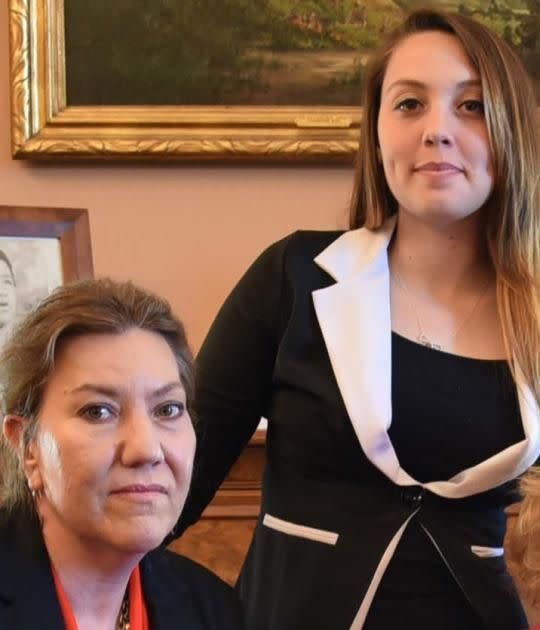Right-to-Die Mom Christy O’Donnell ‘Proud’ of Calif.’s New End of Life Law — But It May Come Too Late for Her

“I’m doing everything I can to still live while dying,” says O’Donnell, pictured here with her daughter, Bailey, on a recent trip to the Bahamas. (Photo courtesy of Christy O’Donnell)
California Gov. Jerry Brown signed the controversial End of Life Option Act into law Monday, making it legal for adults suffering from a terminal illness to have the option of medical aid in dying.
Brown explained in a signing message to the California State Assembly that he came to his decision after speaking with supporters of the act and members of the opposition — as well as personal reflection.
“In the end, I was left to reflect on what I would want in the face of my own death,” he wrote. “I do not know what I would do if I were dying in prolonged and excruciating pain. I am certain, however, that it would be a comfort to be able to consider the options afforded by this bill. And I wouldn’t deny that right to others.”
California attorney Christy O’Donnell, a 47-year-old single mother who is dying from lung, brain, spine, rib, and liver cancer, welcomed news of the signing. She has been a public advocate of the act and testified in support of the bill before the Senate and Assembly this year.
Watch Yahoo Global News Anchor Katie Couric interview Christy O’Donnell and her daughter, Bailey, about Christy’s battle to die with dignity. (Video: Yahoo News)
“I could not be more proud to be a Californian, that I chose to live here, and raise my daughter here,” O’Donnell tells Yahoo Health. “I’m very proud of our governor for standing up and being very thoughtful and articulate in the decision he made.”
O’Donnell was at lunch with her daughter, Bailey, when she got the news. “We’re still waiting for it to sink in,” O’Donnell says. “But we hugged each other and she said she was proud of her mama. … What mom doesn’t want to hear that?”
The End of Life Option Act was modeled after Oregon’s Death With Dignity Act, which legalizes physician-assisted dying (with restrictions). Brittany Maynard, a woman with brain cancer who advocated for terminally ill people’s end-of-life choice, moved to Oregon from California to take advantage of the law. She ended her life in November 2014 with medication prescribed by her doctor.
California now joins Oregon, Vermont, Montana, and Washington as the fifth state to allow terminally ill patients to legally end their own lives.

Christy O’Donnell and her daughter, Bailey. (Photo courtesy of Christy O’Donnell/Compassion & Choices)
The bill had stalled in July in the face of strong opposition from religious groups, and it seemed unlikely that O’Donnell would see it passed.
But while O’Donnell says she’s “very excited” about the possibility of terminally ill patients having the option to die peacefully in California, she points out that the law may come too late for her. “Because of the procedural hurdles, it won’t take place until January,” she says. “Given my prognosis, it’s still unlikely that I would be able to use it.”
O’Donnell says she has good and bad days. “Today is a good day, but the last few days I’ve had kidney infections in both kidneys and have been bedridden,” she says. “There are always some tough days.”
O’Donnell also has a lawsuit in pending against the state of California, in which she asked the state to allow her doctor to prescribe life-ending medication without criminal prosecution so that she can end her life before her cancer does.
Related: Should a 17-Year-Old Be Allowed to Choose Death?
“The courts have taken the position that this is something for the legislature, not the courts,” she says of her lawsuit. Now that the governor has signed the End of Life Option Act, O’Donnell says she hopes the court will get involved and expedite the process for people like her. “We need it now,” she said.
O’Donnell stresses that she wants to live — but she also doesn’t want to die in excruciating pain.
“I’ve had brain surgery, 12 months of extremely painful, difficult chemotherapy, and other surgeries,” she says. “I’ve done everything I can to live. I don’t want to die.”
O’Donnell adds that her support of aid in dying doesn’t mean she’s given up her fight. “When I get to the point that my doctors tell me my lung is filling up with fluid or my liver is shutting down and my future is going to be filled with pain — that is the point when I would absolutely take medication if aid in dying is legal,” she says.
“Being bedridden and in excruciating pain is not quality of life, not for me.”
O’Donnell urges that people who are opposed to the new law make an informed opinion. “Almost all of the arguments of the opposition have been addressed in the bill,” she says. “What hasn’t is someone’s personal or religious belief — in that case, it’s their religion, their own morals.”
As for her future, O’Donnell says the best hope she has is that she experiences a “nonmedical miracle and I no longer have cancer.” Short of that, she hopes that her daughter will have a loving, long, and productive life after she’s gone.
“I’m doing everything I can to still live while dying,” she says — and that includes an upcoming family vacation.
O’Donnell is also hopeful that she’ll still be alive in January and able to benefit from the law she’s worked so hard to support. But, she adds, “It’s just not very likely.”
Read This Next: One Woman’s Quest to Die With Dignity — and What It Means for Us All

